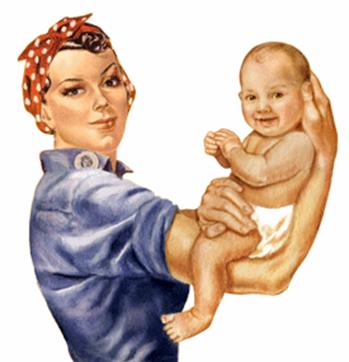My pregnancy is not a gift for you. Image from Pixabay.
I, and other Go Girl writers, have commented before about the various ways in which cis women’s bodies get colonized when we go out in public. We get catcalled, groped, guided, condescended to, and assaulted. The types of control to which we are subjected depend on our current locations and, subsequently, how our bodies are read: Are they fat? Abled? Black? “Exotic?”
Recently, wandering around Colorado Springs, I became aware of another form of body subjugation to which I had previously been unaware: the taking over of the pregnant body.
If you spend any time at all on the Internet, you’ve probably come across someone — a blogger, a friend, a Buzzfeed article — warning you of the dangers of touching a pregnant person’s body without permission. This informal awareness-raising campaign appears to have done some good, at least for me, as no one has yet molested my person without first getting my consent.
What hasn’t slowed down is the unsolicited commentary on my body and my choices:
1. “Here, let me get that box for you. You’re not allowed to lift things.” (The box in question weighed about two pounds.)
2. “Are you sure you’re allowed to be eating that?” (From someone without any medical training.)
3. “Are you sure you’re big enough? Is baby getting enough food?” (Frequently heard, as I’m carrying low and also apparently good at concealing my binge eating.)
4. “Thank you.” (From a strange woman, watching me rub my belly in a waiting room, immediately setting off my paranoia as an ardent abortion-rights activist living in an ultraconservative abortion-hating city.)
5. And, most frequently, “You can’t do that!” (“That” may be anything from “have a cup of tea” to “chase down a play therapy client” to “get a flu shot.”)
Initially, what bothered me most about these remarks was that they left me feeling helpless, like I was somehow incapable of growing a healthy baby, making safe choices, or simply functioning as a human being because I was growing a parasite. As a passionately independent person, that rubbed me quite the wrong way!
I’ve caught on to something much more insidious, though: These comments are part and parcel of a much larger system that has definitive, and punitive, views about pregnancy, birth, and parenthood.

When we get pregnant, we may be caught between having to be superwoman and having to give up our rights. Image from wilpf.org.
How society sees the pregnant woman
I was looked at differently when I couldn’t wear my wedding ring for a few weeks, for example, and, in a city with a robust homeless population, I receive a lot fewer pleasantries when I go out in ill-fitting or stained clothes (thanks, pregnancy clumsiness). Colorado Springs is far more conservative than most of the rest of the U.S., I’ll admit, but the undercurrent message I’ve been receiving is that my pregnancy is okay because I’m married, an adult, socioeconomically functional, and — I’d bet anything on it — white.
This isn’t just a phenomenon that’s limited to Colorado Springs. Across the U.S. women have been legally obligated to give birth in certain ways and have faced criminal charges if they refuse to comply. Pregnancy, drugs, and alcohol have been policed for decades in ways that disproportionately punish some mothers over others. The current diagnostic manual for mental health disorders in the U.S., the DSM-V, has a preliminary set of criteria for diagnosing neurodevelopmental disorders due to prenatal alcohol exposure that includes the criteria, “Exposed to alcohol at any time during gestation, including prior to pregnancy recognition.” It makes me wonder how long it’d be before we started witch-hunting the people who drank between conception and the positive pregnancy test, all in the name of “a healthy pregnancy” and/or “a healthy baby.” Note, however, that employers in the U.S. are still free to discriminate against pregnant workers in the name of “a healthy business.” Oh, the irony.
The problem isn’t that people make comments or jurisprudence because they overwhelmingly hate women (or me), and, unlike most forms of subjugation, this one generally doesn’t result in physical violence or assault.
The problem is that, as soon as I got pregnant, the city — and the national legal system — stopped seeing me as a person and started seeing me as a vessel. Somehow, by doing something that should be incredibly powerful, I wound up feeling more disempowered than I have in a long time.
My question to you:
I usually like to end my posts on an uplifting, here’s-how-we-create-change note, but it’s very difficult to accomplish that at the moment.
What I’ll leave off with, then, is this: To the members of Go Girl Travel Network who live outside the U.S.: What are your experiences of pregnancy and childbirth? What do your countries, cities, cultures say about pregnant bodies? What’s the jurisprudence like where you are? And, if it’s better than it is here, would you please send me a plane ticket?
